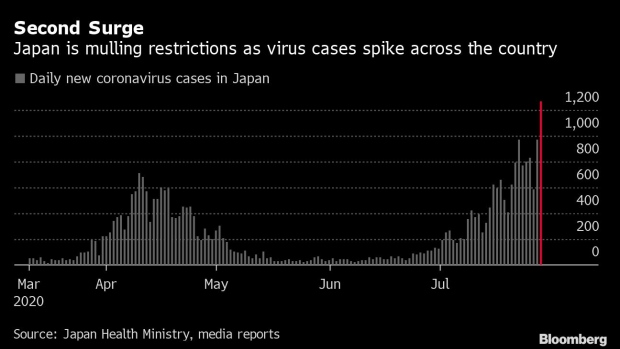Jul 30, 2020
Tokyo to Limit Bar and Restaurant Hours as Infection Spreads
, Bloomberg News

(Bloomberg) -- Officials in Japan are planning stricter measures on businesses and group activities as coronavirus cases continue to spread from a concentration around the capital to other urban areas across the country.
Tokyo will ask bars, restaurants and karaoke stores to shorten their business hours, the Nikkei reported. The shops will be asked to shut at 10 p.m. local time from August 3 until the end of the month, the first such restrictions since the capital lifted all such caps in June.
The national government is also considering limiting the number of people that can dine out together or shortening business hours as part of a three-stage series of restrictions that would allow local governments to gradually introduce limits before the imposition of a state of emergency, Kyodo reported.
The moves come as the country saw a record number of cases on Wednesday. Many areas are braced for the possibility of even higher figures on Thursday, with test results delayed by a four-day holiday last weekend expected to be collated today.
Tokyo found nearly 370 cases on Thursday, Kyodo said, which would be a record. The city also conducted around 5,800 tests, the highest ever, Governor Yuriko Koike earlier said.
Thursday’s cases would broadly be in line with recent positive test rate of 6.5%, and doesn’t represent the sizable jump that some had feared. Infections have spiked in the capital on Thursdays of late, as more suspected cases are tested on Mondays with many hospitals and clinics closed during the weekend.
Tokyo officials, speaking at a meeting monitoring the spread of the pandemic, cited the increase in infections in situations where people remove their masks, such as while having meals or drinking, or within households.
“I want people to avoid going to nighttime entertainment districts to eat and drink,” Tokyo Governor Yuriko Koike said. “The infection is spreading across all age groups.”
Initial Spread
Having initially controlled the pandemic after a nationwide state of emergency, the coronavirus began surging again in Japan in mid-June, as clusters of cases appeared in night clubs and among younger people. Although originally focused around the Tokyo area, infections have jumped in recent weeks in metropolitan areas that had originally drawn praise for quickly tackling the first wave.
In Osaka, Japan’s second largest metropolitan area, cases topped 200 for the first time on Wednesday -- almost level with the 250 reported in Tokyo the same day, despite a much smaller population. Officials have already called for people to refrain from drinking in groups of five or more, and the governor is considering asking businesses in a popular nighttime district to voluntarily close.
Infections have also flared in Aichi prefecture, an industrial heartland home to Toyota Motor Corp., while two cases were reported in northern Iwate prefecture, which had drawn attention for being the only region in the country free of Covid-19.
Record Australia Cases; U.S. Deaths Top 150,000: Virus Update
As new infections have increased, officials aim to target certain businesses and activities rather than calling for broad restrictions as during the state of emergency. While Hong Kong, Australia, Vietnam and other countries have imposed stricter rules as cases spike, Japan has so far taken a lighter touch -- though even if a state of emergency was enforced again, the country’s ability to enforce a lockdown is limited by civil liberties enshrined in the constitution.
Underlying that strategy is also the economic reality in a nation that is already in recession. Koike said in an interview with the Nikkei newspaper that a broad request to close businesses across Tokyo would have too large an economic burden, and that the city would “strategically” issue such requests. Koike is set to hold a press conference at 5 p.m. local time today.
(Updates throughout with latest information)
©2020 Bloomberg L.P.